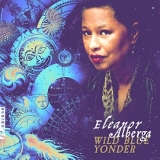 Eleanor Alberga: No-man’s-land Lullaby + Shining Gate of Morpheus + Succubus Moon + The Wild Blue Yonder; Thomas Bowes, Violine, Eleanor Alberga, Klavier, Richard Watkins, Horn, Nicholas Daniel, Oboe, Ensemble Arcadiana (Thomas Bowes, Oscar Perks, Violine, Andres Kaljuste, Viola, Hannah Sloane, Cello); 1 CD Navona Records NV6346; Aufnahmen 1996, 1997, 2019, Veröffentlichung 23.04.2021 (49') – Rezension von Remy Franck
Eleanor Alberga: No-man’s-land Lullaby + Shining Gate of Morpheus + Succubus Moon + The Wild Blue Yonder; Thomas Bowes, Violine, Eleanor Alberga, Klavier, Richard Watkins, Horn, Nicholas Daniel, Oboe, Ensemble Arcadiana (Thomas Bowes, Oscar Perks, Violine, Andres Kaljuste, Viola, Hannah Sloane, Cello); 1 CD Navona Records NV6346; Aufnahmen 1996, 1997, 2019, Veröffentlichung 23.04.2021 (49') – Rezension von Remy Franck
Vier Kammermusikkompositionen der 1949 in Jamaika geborenen britischen Komponistin Eleanor Alberga sind auf dieser CD von Navona zu hören.
No-man’s-land Lullaby wurde inspiriert durch den Besuch von Schauplätzen des Ersten Weltkriegs und Paul Fussells Buch The Great War and Modern Memory. « Es waren die Bilder des Ersten Weltkriegs, die diese Dinge schließlich zusammenbrachten, vor allem das Bild von Männern, die langsam und trostlos an einem Ort namens Niemandsland sterben », sagt die Komponistin über ihr berührendes Stück.
Shining Gate of Morpheus (2012) für Horn und Streichquartett behandelt das Thema Schlaf und Träume vor dem Hintergrund der griechischen Mythologie. Das ergibt Raum für ein abwechslungsreiches, teils erregtes, teil lyrisches Stück, dem man eine gewisse Originalität nicht absprechen kann.
Das 2007 entstandene Succubus Moon für Oboe und Streichquartett stellt die nachdenkliche Ruhe des Monds den dämonischen Trieben der Dämonin Sukkuba, gegenüber und verlangt vom Oboisten ein technisch herausforderndes, ausdrucksvoll-rhetorisches Spiel, das Nicholas Daniel mühelos und mit brillanter Virtuosität garantiert.
The Wild Blue Yonder (1995) für Violine und Klavier ist ein Stück, mit dem die Komponistin die Ankunft eines Menschen in einem total fremden Umgebung schildern will. Das führt, wie man hört, zu Reaktionen von Ratlosigkeit, Winseln bis zu Entsetzen, Herzrasen und Verfolgungswahn. Die Coda bringt die Ergebung ins Unvermeidliche.
Four chamber music compositions by British composer Eleanor Alberga, born in Jamaica in 1949, are featured on this CD from Navona.
No-man’s-land Lullaby was inspired by visiting World War I sites and Paul Fussell’s book The Great War and Modern Memory. « It was the imagery of the First World War that finally brought these things together, especially the image of men dying slowly and uncomforted in a place called No-man’s-land, » the composer says of her moving piece.
Shining Gate of Morpheus (2012) for horn and string quartet explores the theme of sleep and dreams against the backdrop of Greek mythology. This makes room for a varied piece, part agitated, part lyrical, that cannot be denied a certain originality.
The 2007 Succubus Moon for oboe and string quartet juxtaposes the pensive tranquility of the moon with the demonic drives of the demoness Succuba, and demands technically challenging, expressively rhetorical playing from the oboist, which Nicholas Daniel guarantees effortlessly and with brilliant virtuosity.
The Wild Blue Yonder (1995) for violin and piano is a piece with which the composer wants to portray the arrival of a person in a totally foreign environment. This leads, as one can hear, to reactions ranging from perplexity and whimpering to horror, racing heart and paranoia. The coda brings the surrender to the inevitable.
























